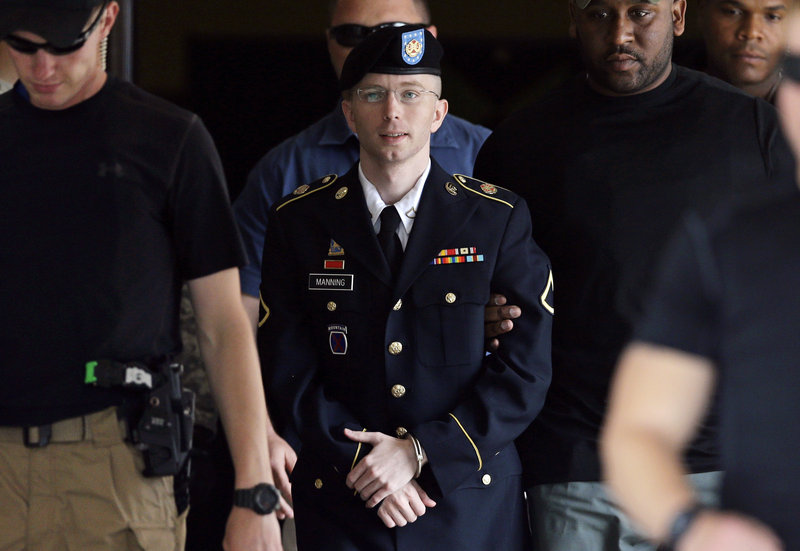A counterterrorism policy should be guided by thoughtful realism, not by fear. Too often, that’s not the case.
So, the verdict in the Bradley Manning espionage trial was a pleasant surprise.
Military judge Col. Denise Lind found Manning guilty of most of the charges he faced for stealing thousands of documents that were published worldwide on the WikiLeaks website. But she acquitted Manning on the most serious count, aiding the enemy, which could have put him in prison for life.
Judge Lind recognized that it’s just as wrong to overreact in the fight against terrorism as it is not to react at all. The use of torture, abuse of prisoners and the ongoing embarrassment of the prison at Guantanamo Bay are all examples of times when government officials have gone too far, and the damage they have done to our reputation as a nation is something we may not overcome for a long time.
If you don’t believe that, look at a letter sent this week to Russia’s minister of justice by Attorney General Eric Holder, who is attempting to extradite leaker Edward Snowden from Russia. Snowden had told authorities there he’d be tortured and possibly executed if he were returned to this country.
Holder called the claims “entirely without merit” and wrote, “Torture is unlawful in the United States.” Holder added that Snowden would not face the death penalty for revealing the existence of a secret program of the National Security Agency to collect telephone and computer use data.
When the attorney general of the United States has to defend the credibility of America’s human rights policies to the government of Russia, we should admit that there is a cost to the anti-terrorism overreactions of the last decade. Torture may be against the law, but the world knows that people in the U.S. government can get around those laws when they want to, and no one has been punished for going too far.
Manning may have broken the law when he copied thousands of pages of reports of incidents on the ground in Iraq that challenged the rosy picture of the war he thought Americans were seeing through the media. But the war itself was an overreaction to 9/11. It would have been a grave injustice to convict him of aiding the enemy when his intent — whether you find it heroic or misguided — was to help his country see the truth.
Since 9/11, restraint and commitment to due process and the rule of law have been criticized as soft on terrorism. Col. Lind’s verdict shows that it is possible to draw a line and say that some responses go too far, even if they are intended to make us safe. This is a line that we should not be afraid to draw more often.
Send questions/comments to the editors.



Success. Please wait for the page to reload. If the page does not reload within 5 seconds, please refresh the page.
Enter your email and password to access comments.
Hi, to comment on stories you must . This profile is in addition to your subscription and website login.
Already have a commenting profile? .
Invalid username/password.
Please check your email to confirm and complete your registration.
Only subscribers are eligible to post comments. Please subscribe or login first for digital access. Here’s why.
Use the form below to reset your password. When you've submitted your account email, we will send an email with a reset code.